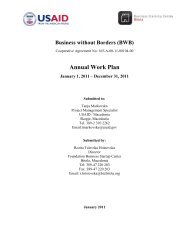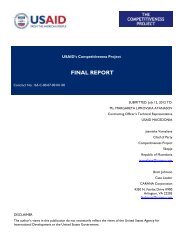USAID'S COMPETITIVENESS PROJECT - USAID Macedonia
USAID'S COMPETITIVENESS PROJECT - USAID Macedonia
USAID'S COMPETITIVENESS PROJECT - USAID Macedonia
You also want an ePaper? Increase the reach of your titles
YUMPU automatically turns print PDFs into web optimized ePapers that Google loves.
Workforce Development<br />
Although <strong>Macedonia</strong> suffers from an<br />
unemployment rate as high as 36%,<br />
companies (and investors) often complain<br />
about a permanent shortage of talented<br />
employees and candidates. This disconnect<br />
between supply and demand of workers is a<br />
serious impediment to companies’ ability to<br />
compete in a global economy, to the point<br />
that skills shortages are widely<br />
acknowledged as the most critical issue<br />
facing the growth of <strong>Macedonia</strong>’s economy.<br />
The shortages are particularly acute in<br />
highly skilled, knowledge‐based, innovative<br />
and technological areas crucial to growth‐<br />
Key Activities Key Outcomes<br />
• Regional promotion of My<br />
Career activities in Tetovo<br />
and Stip<br />
• Trainings on writing and<br />
communication skills and<br />
mentorship trainings in<br />
Skopje, Prilep, Zito Luks<br />
Procredit bank and<br />
American College<br />
• GCDF ToT workshop and<br />
certified GCDF Trainers<br />
oriented industries such as ICT, but also hinder competitiveness in traditional sectors like light manufacturing<br />
and apparel.<br />
Skills shortages also undermine efforts to attract investment. While tax incentives and low production costs<br />
can help attract international companies to <strong>Macedonia</strong>, the availability and trainability of its workforce often<br />
play a large role in the final decision process. If a company considering <strong>Macedonia</strong> as an investment location<br />
feels it must use significant resources to train employees to meet its skills requirements, it may choose to<br />
locate where a workforce with the required skills already exists.<br />
MCP’s Workforce Development Component uses systematic and market‐led solutions to ‘”fix the broken links”<br />
between what businesses need and the workforce can offer. It uses engagement with the market, employers,<br />
and training/education institutions to identify skills gaps and design programs that either provide individuals<br />
with the training and experience needed to be more productive members or the workforce, or help improve<br />
the quality, availability, delivery and market orientation of training and education services. These activities can<br />
be geared towards improving the overall competitiveness of <strong>Macedonia</strong>’s labor pool, or address issues related<br />
to an area of market growth or a specific investment opportunity.<br />
This quarter, activities in workforce development continued its focus on implementing the sustainability plan<br />
for the MyCareer internship and job placement initiative, specifically by selling services to earn revenue,<br />
certification training in project management, and introducing the first generation of <strong>Macedonia</strong>n trainers in<br />
career counseling.<br />
An overview of activities and accomplishments during second quarter of FY 2011 is presented below.<br />
National Internship and Job Placement Program (NIJPP) new business model<br />
• Total of 663 students, and 13 new<br />
companies registered on<br />
www.MyCareer.com.mk<br />
• Total of 106 internship placements<br />
and 105 permanent jobs facilitated<br />
through My Career<br />
• My Career NGO sold 34 packages<br />
worth $5,153<br />
• Collected $830 from selling<br />
individual services<br />
12 GCDF Trainers Certified<br />
Throughout FY 2010, the MCP Workforce Development team worked to develop a sustainable business model<br />
for MyCareer. After conducting interviews with key stakeholders such as companies, universities, chambers of<br />
commerce, associations and government ministries, MCP decided to spin‐off MyCareer into an NGO that<br />
would charge companies, universities and possibly intern/job applicants for its services. The MyCareer team<br />
developed a variety of service packages to be offered to employers and started sales efforts to gain initial<br />
customers and created a variety of other revenue sources. In addition to internship placements; Global Career<br />
Development Facilitator certification program, HR recruitment services and organization development services<br />
will be part of the portfolio to be offered as new services to users. The first services will be offered as training<br />
in large groups or as one‐to‐one consultancy/counseling about the client. As for the HR recruitment service,<br />
22




